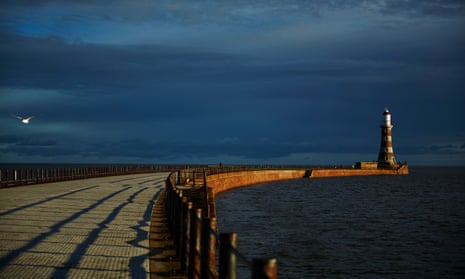I often wonder whether in order to see the whole shape of a place you must leave and feel the contours of its edges. To leave means you can return, but not as the same person. I grew up in Sunderland and left at 18, desperate to shed my skin and become someone different. At 24 I sat down to write my first novel and the raucous bars and rusty bridges of my hometown rushed out of me with a bright, hot urgency. Working-class lives are not often recorded in literary novels, so I wrote them down to remember. I had a seasick feeling that the stories of the people I loved were slipping away. I wrote them down to prove to myself I had a history.
I wrote about Sunday afternoons at Seaburn Beach in the 90s, where I pushed hot coppers through silver slots at the amusement arcades and zipped up my Puffa jacket tightly. I put too much salt and vinegar on my chips and ate them looking at the sea. The waves crashed against Roker Pier like fireworks, spilling over the sides and flooding the footpath. My dad and I squinted into the spray and saw small figures running towards the lighthouse.
“Wave dodgers.” My dad shook his head. He explained that teenagers played a game where they stood on the edge of the pier and tried to run to safety just before the waves hit. “It’s completely crackers,” he said. “Those waves are strong. Sometimes the kids get pulled under and their bodies wash up later on the beach.” We watched the water swell and churn. I felt the pull of it in my stomach.
“Why do they do it, then?” I asked him.
“Got nothing better to do, I suppose.”
It was a delicate balance to portray the invincibility and precarity of Sunderland simultaneously. The people I know are inconceivably strong and capable, but their lives are not deemed worthy of investment by those in power, which makes them vulnerable, too.
I wrote about Saturday nights down Holmeside in the late 2000s. My best friend and I toasted Ribena-coloured glasses of rosé wine, backcombed our hair with toothbrushes and threw peeling leather jackets over bodycon dresses. We linked arms through clouds of Silvikrin and scraped our heels across the pavement to Independent, our local indie club. Vodka shots cost 50p and we spun through smoke together. We danced all night to Foals and the Klaxons, holding hands in the smoking area as boys in eyeliner and red Libertines jackets asked us for a light. We grazed our knees on the sticky dance floor and lost our keys and phones without caring. We didn’t hold much power in the world and we knew it, but those dark, wild hours belonged to us.
The protagonist of my novel moves to London for university. She feels inadequate because she doesn’t have the right words or books or clothes with which to move through the capital. When she returns home to visit Sunderland, she feels the sudden bruise of what she gave away.
“I couldn’t compete with other people at university in terms of money or knowledge or intelligent witticisms,” she realises, “but the music and the dancing were absolutely mine.”

After I moved away, I went back to visit and walked through Jacky Whites Market. I moved towards the fish stall where my gran used to work. It shone; iridescent with memory. I watched the stranger behind the counter, her pink hands chopping and slicing and I looked at my own long fingers. My mam always says they remind her of my gran and I wondered whether I could really lay claim to that; to the bleach-stung skin and knife-nicked cuticles of a woman who died before I was old enough to ask questions.
When my novel was published, I signed copies of it at Sunderland Waterstones. I sat behind a stack of books, wondering if I really had a right to write about the city. After all, I had left it in search of something else and returned as a different person. I had allowed my accent to soften like wax. Perhaps it was all a mythical origin story, invented because I wanted to belong. But then people began to arrive. My great-auntie came first with her bleach-blonde hair, beaming with book in hand. My nan and grandad, in coats and jumpers, fussing over cups of tea. My primary schoolteachers. My cousins. My Auntie Marie and Uncle Jim.
“I can’t believe it,” said Uncle Jim, wiping his eyes. “You’ve got it all spot on, love. That’s really how it was.” Suddenly we were a family and all of it was real. My life has taken a different shape, but our shared history is stacked tall inside of me. I still love going out dancing. I still feel the pull of the sea. We are from here, our stories matter, this one is mine and it belongs to me.
